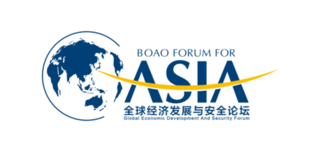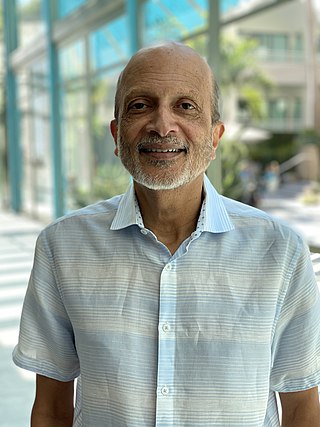
The Group of Eight (G8) was an intergovernmental political forum from 1997–2014. It had formed from incorporating Russia into the G7, and returned to its previous name after Russia was expelled in 2014.
AIESEC is an international "youth-run" and led, non-governmental and not-for-profit organization that provides young people with business development internships. The organization focuses on empowering young people to make a progressive social impact. The AIESEC network includes approximately 40,000 members in 120+ countries.

Asia-Pacific Economic Cooperation is an inter-governmental forum for 21 member economies in the Pacific Rim that promotes free trade throughout the Asia-Pacific region. Following the success of ASEAN's series of post-ministerial conferences launched in the mid-1980s, APEC started in 1989, in response to the growing interdependence of Asia-Pacific economies and the advent of regional trade blocs in other parts of the world; it aimed to establish new markets for agricultural products and raw materials beyond Europe. Headquartered in Singapore, APEC is recognized as one of the highest-level multilateral blocs and oldest forums in the Asia-Pacific region, and exerts significant global influence.

The World Economic Forum (WEF) is an international advocacy non-governmental organization and think tank, based in Cologny, Canton of Geneva, Switzerland. It was founded on 24 January 1971 by German engineer Klaus Schwab.

The International Astronautical Federation (IAF) is an international space advocacy organization based in Paris, and founded in 1951 as a non-governmental organization to establish a dialogue between scientists around the world and to lay the information for international space cooperation. It has over 390 members from 68 countries across the world. They are drawn from space agencies, companies, universities, professional associations, museums, government organizations and learned societies. The IAF organizes the annual International Astronautical Congress (IAC). As of 2019, Pascale Ehrenfreund has served as the president of the IAF.

The World Evangelical Alliance (WEA) is an interdenominational organization of evangelical Christian churches with 600 million adherents that was founded in 1846 in London, England, to unite evangelicals worldwide. WEA is the largest international organization of evangelical churches. It has offices at the United Nations in New York City, Geneva, and Bonn. It brings together nine regional and 143 national evangelical alliances of churches, and over one hundred member organizations. Moreover, a number of international evangelical denominations are members of the WEA.

The Community of Portuguese Language Countries, also known as the Lusophone Community, is an international organization and political association of Lusophone nations across five continents, where Portuguese is an official language. The CPLP operates as a privileged, multilateral forum for the mutual cooperation of the governments, economies, non-governmental organizations, and peoples of the Lusofonia. The CPLP consists of 9 member states and 33 associate observers, located in Europe, South America, Asia, Africa and Oceania, totaling 38 countries and 4 organizations.
The International Lutheran Council (ILC) is a worldwide association of confessional Lutheran denominations. Member bodies of the ILC hold "an unconditional commitment to the Holy Scriptures as the inspired and infallible Word of God and to the Lutheran Confessions contained in the Book of Concord as the true and faithful exposition of the Word of God." The member church bodies are not required to be in church-fellowship with one another, though many of them are.

The Boao Forum for Asia, initiated by 25 Asian countries and Australia, is a nonprofit that hosts high-level forums for leaders from government, business and academia in Asia and other continents to share their vision on the most pressing issues in this region and the world at large. Though its fixed address is in Bo'ao, Hainan province, China, its Secretariat is based in Beijing. The forum, sometimes known as the “Asian Davos”, takes its name from the town of Boao, located in China's southern Hainan province, which has been the permanent venue for its annual conference since 2002.
EBAN is an international, not-for-profit trade association whose function is to represent the pan-European early stage investor community, gathering member organisations and individuals from Europe and beyond. Originally targeted only to business angels, it later became a cross sector representative of equity early stage investors.
An angel investor is an individual who provides capital to a business or businesses, including startups, usually in exchange for convertible debt or ownership equity. Angel investors often provide support to startups at a very early stage, once or in a consecutive manner, and when most investors are not prepared to back them. In a survey of 150 founders conducted by Wilbur Labs, about 70% of entrepreneurs will face potential business failure, and nearly 66% will face this potential failure within 25 months of launching their company. A small but increasing number of angel investors invest online through equity crowdfunding or organize themselves into angel groups or angel networks to share investment capital and provide advice to their portfolio companies. The number of angel investors has greatly increased since the mid-20th century.
The Association for Corporate Growth (ACG) is an organization providing a global "community" for mergers and acquisitions and corporate growth professionals. Founded in 1954, ACG has grown to more than 14,500 members from corporations, private equity, finance, and professional service firms representing Fortune 1000, FTSE 100, and mid-market companies. There are 57 chapters in North America and Europe. These chapters meet regularly, support events and provide a forum for senior-level M&A professionals to network, share best practices and source deals.

M.R. (Madhavan) Rangaswami is an Indian software executive, investor, entrepreneur, corporate eco-strategy expert, community builder, and philanthropist. Recognized as a software business expert, he participated in the rapid expansion of the Silicon Valley software industry during his tenure as an executive at both large and small software companies. In 1997, he co-founded Sand Hill Group, one of the earliest “angel” investment firms: in 2007, he founded Corporate Eco Forum.

EU Business School is a private business school with campuses in Geneva (Switzerland), Barcelona (Spain), and Munich (Germany). It is a member of OMNES Education Group since 2022.
The "Graduate Business Forum" (GBF) is a United States based non-profit foundation, best known for its annual global Graduate Business Conference. The conference brings together top business leaders, political leaders, governments and selected students from the top 55 MBA Business Schools in the world to exchange the ideas about best practices on "Student-Government Corporate Social Responsibility (CSR)", "Community Services" and to discuss the "Most Challenging Issues" facing the world from the perspective of a responsible leadership. The Forum also organizes a series of regional meetings throughout the year.

Wolfgang Lehmacher is an international expert, thought leader, technology evangelist, and practitioner in the field of supply chain, transport, and logistics. He has been involved in various transformational initiatives in the industry. The seasoned executive with vast global industry experience anchored in dozens of positions in management and on boards of directors is also a prolific writer and regular speaker at events all across the globe. Important roles include president and CEO of GeoPost Intercontinental, the global investment and expansion vehicle of French La Poste, and director, head of Supply Chain and Transport Industries at the World Economic Forum. The business mentor is advisor to RISE and Global:SF, a not-for-profit organization dedicated to paving the way for international companies to locate, invest, and grow in the San Francisco Bay Area while helping local companies expand into global markets. As an advocate of the circular economy, he is involved in CIRPASS, an EU-funded digital product passport initiative. He also is a member of the Ethical Committee that informs Dynex Moonshots, the investment, strategic, and ethical steward of the Dynex Ecosystem. Dynex is the world's only accessible neuromorphic quantum computing cloud. Jointly with other experts and academics he also conducts surveys like a Claros study, a new method that starts with a ChatGPT-generated list of issues validated by a pool of experts, yielding actual schools of thought in the maritime industry. With his engagement in numerous publications, including the books Wie Logistik unser Leben prägt, Logistik im Zeichen der Urbanisierung, Disrupting Logistics - Startups, Technologies, and Investors Building Future Supply Chains, Circular Economy, and Maritime Decarbonization he contributes to the public discourse. Many of his books have been published at Springer Gabler. He is a Financial Times, Nikkei Asian Review, Business Insider, World Economic Forum Agenda and BVL-Blog contributor. Lehmacher contributes to a broad range of papers, such as "How Technology Can Unlock the Growth Potential along the New Silk Road", "Blockchain Technology for Ports", "Impact of the Fourth Industrial Revolution on Supply Chains", "Trade Tech – A New Age for Trade and Supply Chain Finance", and “Reducing port city congestion through data analysis, simulation, and artificial intelligence to improve the well-being of citizens”. Lehmacher is the lead author of the “Practical Playbook for Maritime Decarbonisation”.

John May is an American venture capitalist, the Managing Partner of the New Vantage Group, which has organized five angel investing organizations in the Washington, D.C. area since 1999, placing funds into more than 50 companies.
The Global Mayors' Forum (GMF) is a three-day international conference held annually by the GMF Council on the topic of urban development. The forum focuses on issues related to sustainable development but also covers other issues including international cooperation, modern development practices, public relations, hosting large scale activities and other topics in the fields of urban planning, economics and international relations. The Global Mayors’ Forum is divided into several conference sessions, forum sessions and meetings. These various sessions have different focuses but are all related to the theme of the GMF for that year. For each conference a new host city is selected by the GMF Council.
The Global Forum on Migration and Development (GFMD) is a state-led, informal and non-binding process, which helps shape the global debate on migration and development. It provides a flexible, multi-stakeholder space where governments can discuss the multi-dimensional aspects, opportunities and challenges related to migration, development, and the link between these two areas. The GFMD process allows governments - in partnership with civil society, the private sector, the UN system, and other relevant stakeholders – to analyze and discuss sensitive issues, create consensus, pose innovative solutions, and share policy and practices.

Baybars Altuntaş is a Turkish entrepreneur, angel investor, speaker and author based in Istanbul. He founded Deulcom International, a vocational training school in Turkey in 1992 and currently serves as the president of the executive committee of the company. He is currently a jury member on the new Turkish entrepreneurship program and is the current host of the Turkish version of The Weakest Link, En Zayıf Halka












